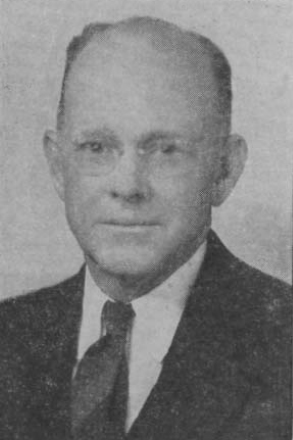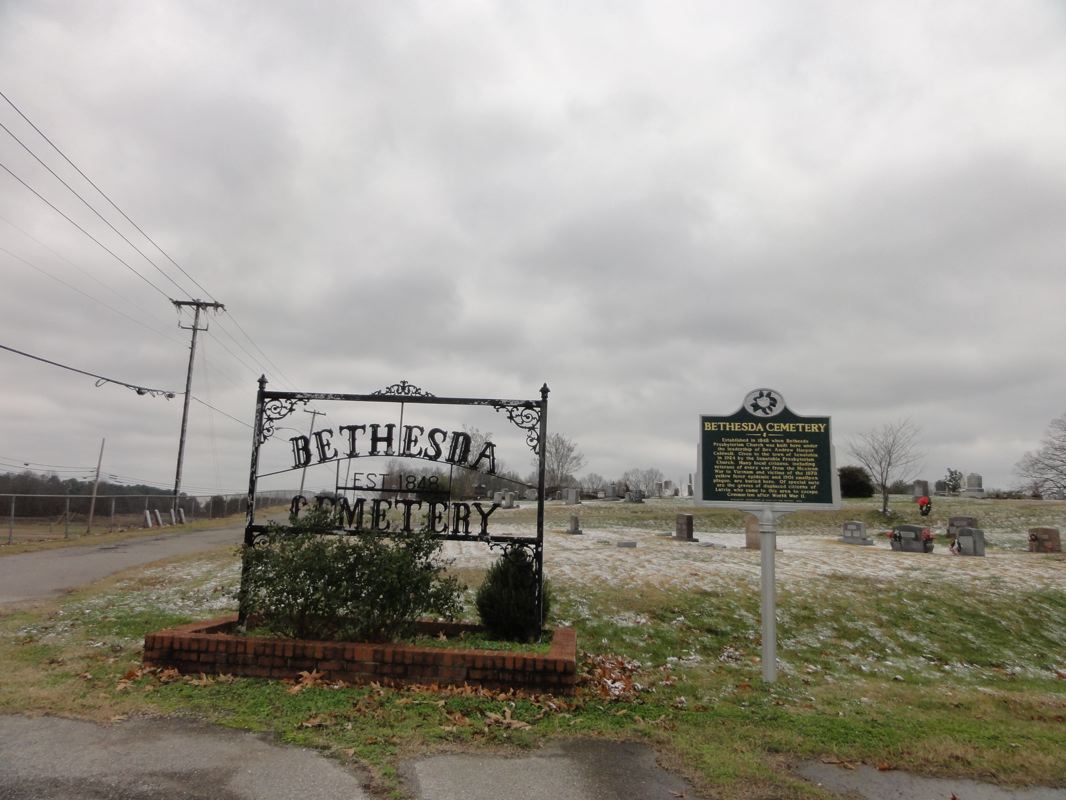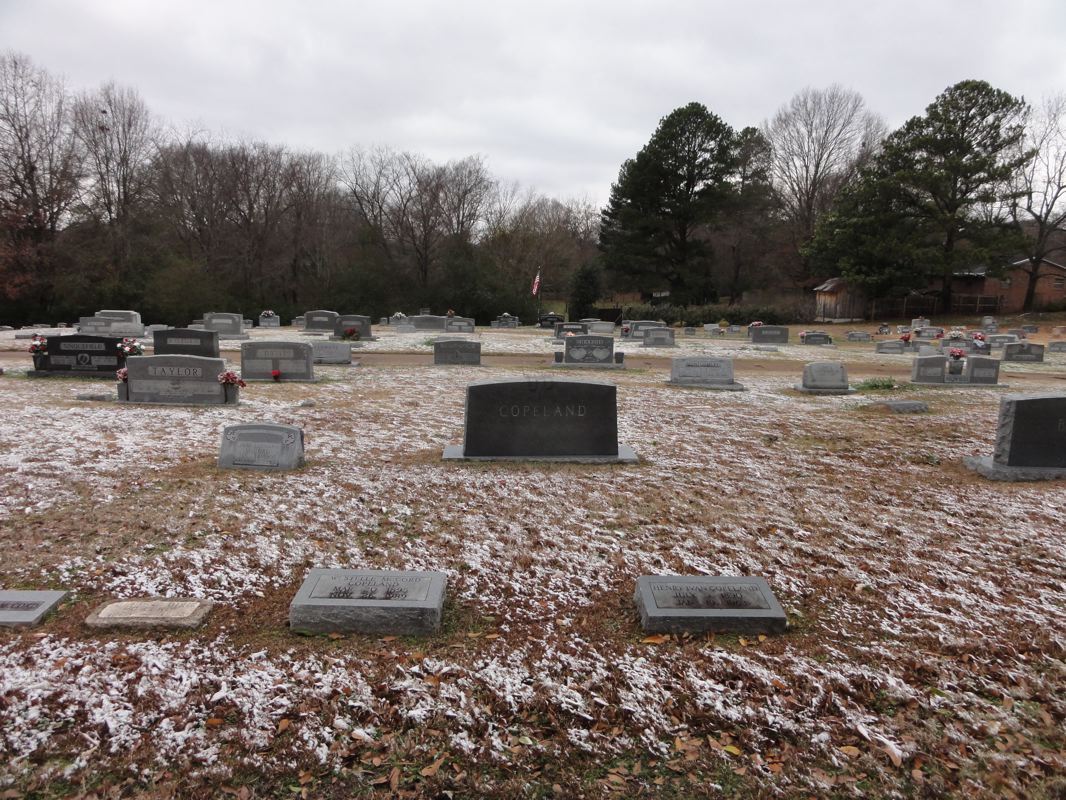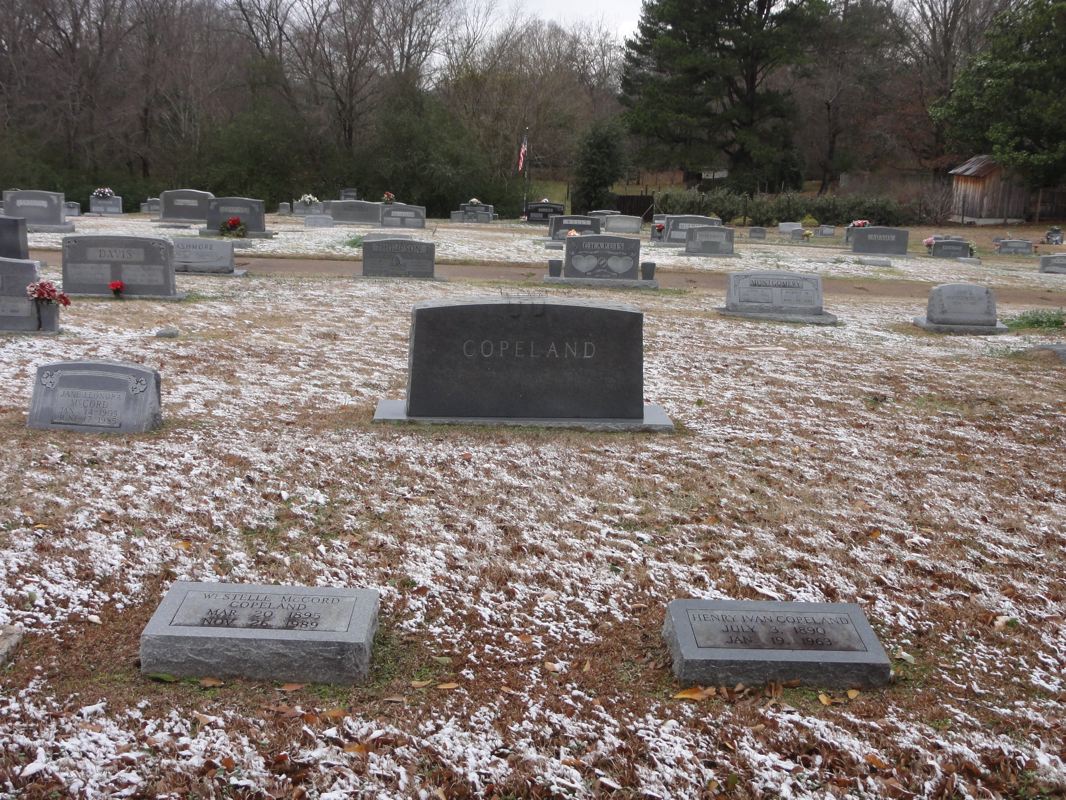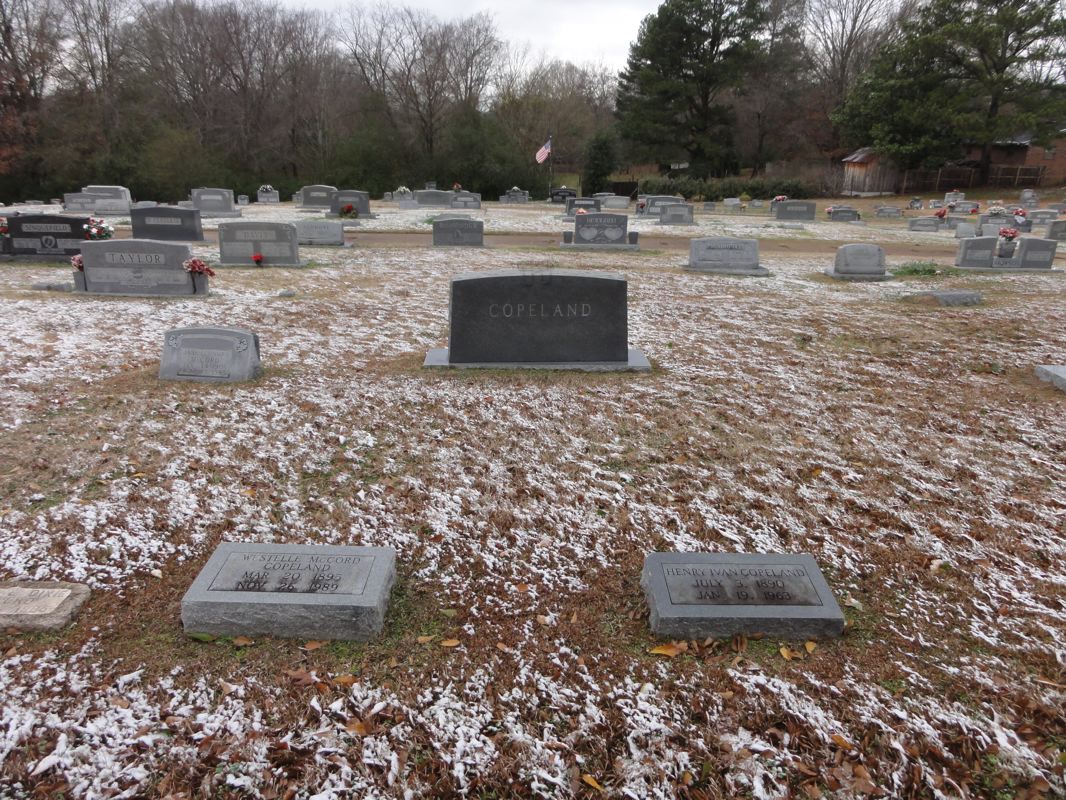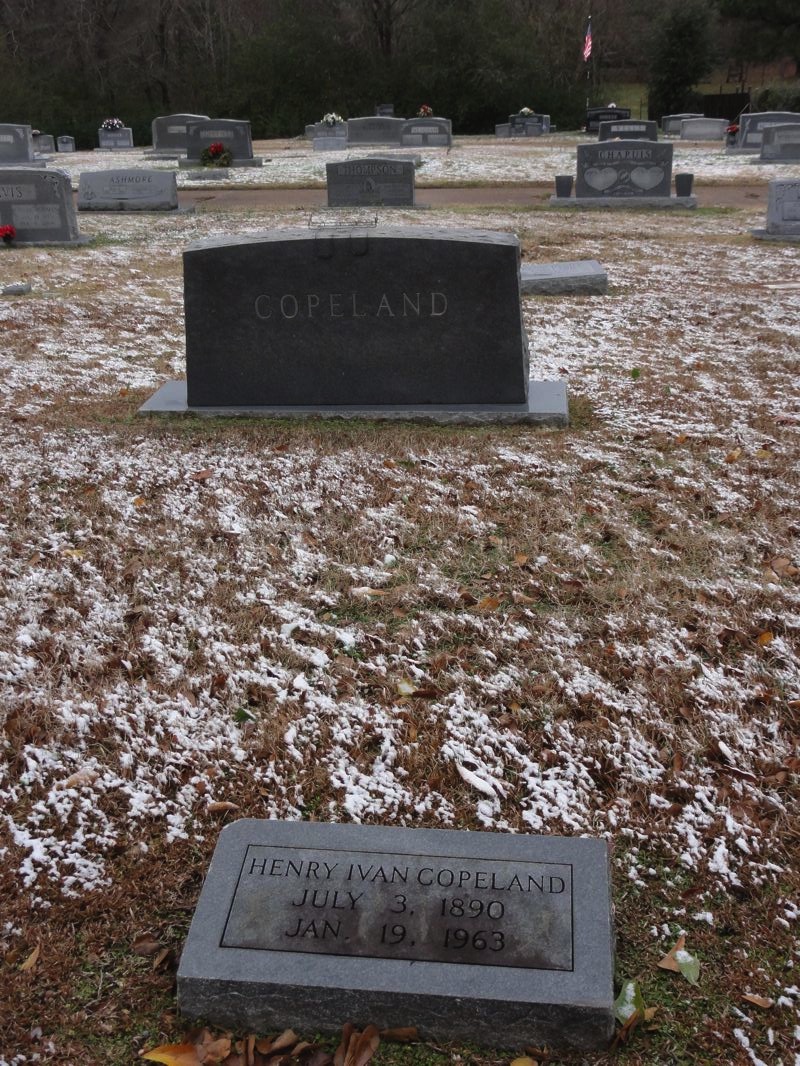Henry Ivan Copeland, Sr.
1890-1963
![]()
H.I. Copeland, Sr.
". . . make known unto you, the beloved brother and faithful minister and fellow-servant in the Lord." (Col. 4: 7.)
The subject of this sketch, H. I. Copeland, was born July 3, 1890, near Dyersburg, Tenn. He is the son of George W. and Mary Hastings Copeland. He was baptized into Christ in August, 1907, by N. B. Hardeman. The following year he entered Freed-Hardeman College, and preached his first sermon in April, 1909. He has been a faithful gospel preacher since that time.
Brother Copeland attended the Nashville Bible School and Thorp Spring Christian College from 1912 to 1914. He entered David Lipscomb College in 1915, and was graduated from it under the presidency of H. Leo Boles in 1917. Brother Copeland has combined teaching and preaching; he has been successful in both fields.
Brother Copeland served the church at Haleyville, Ala., one year, and then began work with the church at Ripley, Tenn. He lived there for nineteen years and taught in the public schools of Ripley and Lauderdale County, Tenn. During this time he continued to study, and received a B.S. degree from Memphis State College in 1928. In 1933 he received his M.A. degree from Peabody College, Nashville, Tenn. In 1936 he moved to Mississippi, and has continued teaching in that state to the present time. During the last three years he has taught history and psychology in the Northwest Mississippi Junior College, Senatobia, Miss.
Brother Copeland has studied the Bible under the guidance of N. B. Hardeman, A. G. Freed, H. Leo Boles, E. A. Elam, and David Lipscomb."
--- H. Leo Boles, Gospel Advocate, March 19, 1942, 276. Note: This is a timed piece. Some of those enlisted as living may be now deceased.![]()
A Great Man Has Fallen In Israel
About one o'clock, Saturday afternoon, January 19, while resting after lunch in his home in Senatobia, Mississippi, Henry Ivan Copeland was called Home, going quietly and peacefully from a heart attack in his sleep. Although retired from teaching, and preaching only by appointments, he was active and in good health except for a heart condition he had bad for a few years. Henry I. Copeland
Brother Copeland was born July 3, 1890, in Dyer County, Tennessee, the son of George W. and Mary Frances Hastings Copeland. He was one of seven children, the other six being two brothers and four sisters. He was reared in Dyer County and attended public schools there. N. B. Hardeman preached in a meeting at Roellen where Brother Copeland lived as a boy. The meeting closed and Brother Hardeman started home in his buggy. Brother Copeland "ran after him, caught up with him, and asked to be baptized." At the age of seventeen he was baptized by Brother Hardeman that night in August 1907.
To prepare himself to preach the gospel, be enrolled In Freed-Hardeman College in 1907, where he studied under Brother Hardeman, Brother Freed, and others. He began preaching in Chester County, Tennessee, in 1909 and continued to preach until his home-going in 1963; making a total of fifty-four years.
With the purpose of further preparation, Brother Copeland entered the Nashville Bible School in 1913. While there he enjoyed rooming with B. C. Goodpasture, whose friendship he treasured through the years and whose work as a preacher of the gospel and as editor of the Gospel Advocate he appreciated. Among his professors were H. Leo Boles, S. P. Pittman, Lacy H. Elrod, and Dr. J. S. Ward. Instructed and inspired by these able teachers in Henderson and Nashville, Brother Copeland had superior preparation for preaching the gospel effectively. He was gratified with this preparation but not satisfied. He continued to study and was a diligent student all his life. Some years after his graduation from the Nashville Bible School, which became David Lipscomb College, he became interested in teaching in the public schools. To prepare himself well for this important work, he pursued his formal education and received his B.A. degree from Memphis State University and his M.A. from George Peabody College.
A major event in the life of Brother Copeland was his marriage to Miss Westelle McCord of Tennessee City, Tennessee, December 25, 1916. She was his understanding, inspirational, influential, and helpful Christian companion and partner for more than forty-six years. She is the mother of their two noble and distinguished sons, Henry I., Jr., and G. Daniel. She was and is an active and dedicated Christian.
Brother Copeland combined teaching in the public schools and in college with preaching during the most of his productive years. He served as superintendent of schools in a number of places in Tennessee and in Mississippi. He was professor of social sciences in Northwest Mississippi Junior College in Senatobia for seventeen years. While there he was instrumental in placing the Bible in the curriculum of the college, which he taught for a number of years.
Wherever he taught, he preached the gospel there and in its surrounding areas. His first love was the church. He served the church as minister in Haleyville, Alabama; in Ripley and other locations in Tennessee; in Senatobia, Thyatira. Antioch, Como, Clarksdale, and other places in Mississippi. He preached for twenty-two years in the small town of Senatobia, where the church grew from a small group meeting in a little frame building to approximately two hundred members meeting in a modern air-conditioned brick building with eighteen classrooms. Brother Copeland did successful evangelistic work In gospel meetings in Tennessee, Mississippi, and Alabama, in addition to local church work. He served his Lord faithfully and ably until he called him home to heavenly service, having preached the Lord's day before and having conducted Bible study and prayer service two days prior to his homegoing.
The funeral sermon tor Brother Copeland was preached by the writer, assisted in scripture reading and prayer by Clarence Dalley, minister for the Union Avenue church in Memphis. There was a large and sympathetic audience of admiring and appreciative friends and relatives in the Senatobia church, Tuesday afternoon, January 22. Internment was in the local cemetery. The text chosen was the statement made by King David concerning the death of Abner: "Know ye not that there is a prince and a great man fallen this day in Israel?" (2 Sam. 3: 38.) These words were descriptive of Abner and are also of H. I. Copeland. He was "a prince and a great man" in many ways, but only five shall be named and these briefly.
1. He was a prince and a great man as a husband. As a husband he was kind to his wife and thoughtful of her needs and wishes. He enjoyed being with her, sharing his interests, his dreams, and his plans. In fact, they planned together and partook of common interests. He appreciated his wife and was grateful for all she did. He practiced the instruction of the poem whose first line reads: "If with pleasure you are viewing the work· your wife is doing, tell her now." Following the Pauline exhortation: "He loved his wife as he loved his own body."
2. Brother Copeland was a prince and a great man as a father. He was the father who set the proper example for his sons. The impress of his noble and princely character continues to be upon them. With the help of his wife, he brought them up "in the nurture and admonition of the Lord" and Instilled into them high ideals and great aspirations to prepare for maximum Christian service. The older son, Dr. Henry I., Jr., is an eminent, creative, and distinguished dentist who has made a number of very important discoveries in dentistry. The younger son, Dr. G. Dan, graduated from Harvard at twenty with his M.D. and is now an eminent and authoritative heart specialist whose counsel is sought in high medical services. Best of all, both sons are faithful and active members of the church, following in the steps of their father and mother.
3. He was a prince and a great man as a teacher. This is revealed in the character and successes of thousands of his students. He was a gentleman his relations with his teachers, his colleagues and his students. "As is the teacher so is the school" was true of him. He greatly improved the schools of which he was superintendent. There are excellent schools today in Tennessee and in Mississippi as monuments 01 his excellence as a superintendent and a teacher. Husbands and wives, fathers and mothers, community leaders, business men and women, and other former students by the thousands would testify to his greatness and princely character as a superintendent and teacher and to the excellence of his instruction and guidance.
4. Brother Copeland was a prince and a great man as a preacher. He was genuinely Christian as a preacher. There was no littleness in him. He thought and walked with the truly great. He was a diligent student of the Bible. He delighted in preaching the glorious gospel of Christ. Like Paul, he desired to lay the foundation so another could build thereon. He seemed to specialize in building smaller churches into larger ones. He was a good and great preacher. As a preacher, he was faithful to God and to his book, the Bible. He always sought to do all the good he could wherever he preached. He fulfilled this desire and did immeasurable good.
5. He was a great man and a prince as a Christian. Obeying the Instruction of the Holy Spirit through Paul, Brother Copeland thought on the things that are "true," ''honorable,'' "just," "pure," "lovely," and "of good report," (Phil. 4: 8.) He knew that as one thinks within himself, so is he. The fruits of the spirit -love, joy, peace, longsuffering, kindness, goodness, faithfulness, meekness, and self-control-were manifested in his life. His ,hearers saw his sermons in action. Wherever he lived, he was known as a good man and a man of good deeds. Like his Savior and Lord, "he went about doing good." We say with the apostle John: "Blessed are the dead who die in the Lord from henceforth: yea, saith the Spirit, that they may rest from their labors; for their works follow with them." (Rev. 14: 13.) As Abel, "He being dead yet speaketh" his influence will live until its waves break in the shores of eternity.
In the true sense, Brother Copeland is not dead. He is only gone from us In body. He will continue to live in our hearts and will be a great inspiration and benediction to his immediate family, to us, to our children, to our children's children, and to all who came in contact with him. In the words of James Whitcomb Riley:
I cannot say, and I will not say
That he is dead—he is just away!
With a cheery smile, and a wave of the hand,
He has wandered into an unknown land,
And left us dreaming how very fair.
It needs must be, since he lingers there.
So think of him faring on, as dear In the love of
There as the love of Here;
Think of him still as the same, I say:
He is not dead—he is just away!
-W.B. West, Jr., Gospel Advocate, April 4, 1963, pages 218,219; Note: This is a timed piece. Some of those enlisted as living may be now deceased.
![]()
Directions To The Grave of H.I. Copeland
H.I. Copeland is buried in the Bethesda Cemetery in Senatobia, Tate County, Missississippi. From Memphis, Tennessee, head south on I-55. Take Exit 265 and head toward town on Main St. (Hwy. 4). Turn left on Hwy. 51/S. Panola St. and the cemetery will be a few blocks south on your right. Enter the cemetery a the main entrance and take a sharp right. Follow the fence line back toward the rear of the cemetery. Look for a large oak tree in the center of a section. Just past the section where the tree is turn left and go up to where the tree is and look to your right. The Copeland plot will be in the front of the section. While in the cemetery, be sure to visit the grave of another gospel preacher of yesteryear, James P. Lowery.
GPS Location
34.611364,-89.970869
View Larger Map
![]()
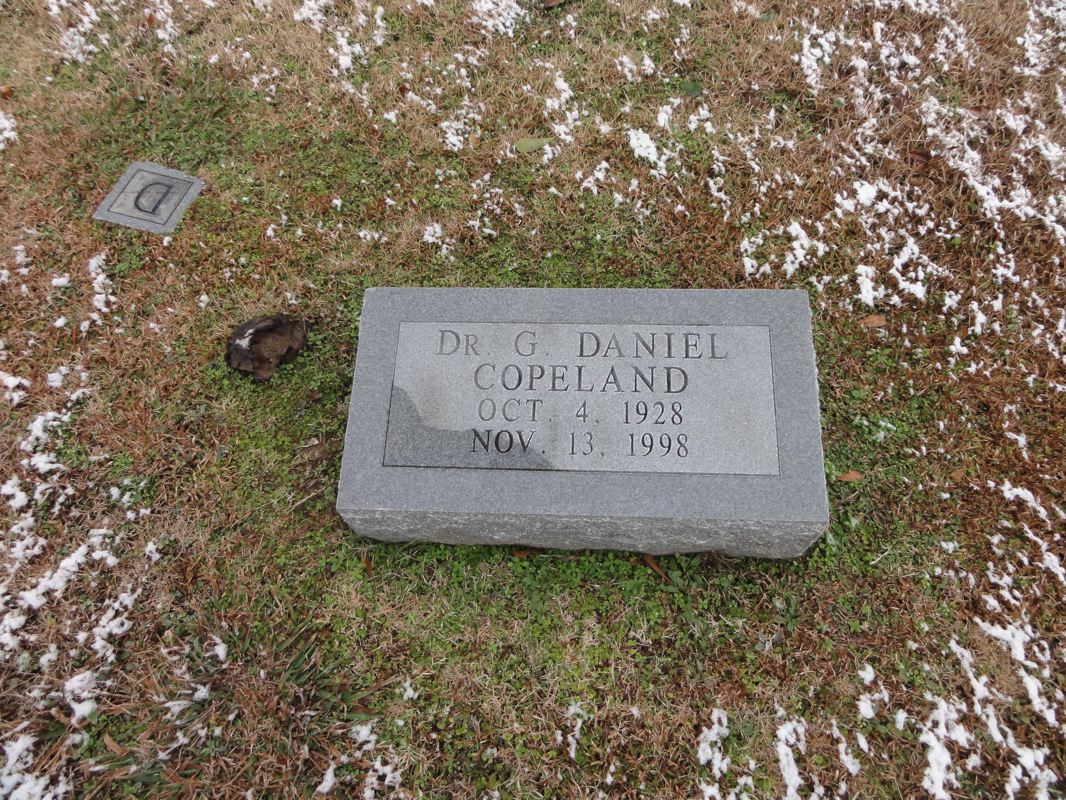
Dr. G. Daniel Copeland
October 4, 1928
November 13, 1998
The son of H.I. & W.M. Copeland
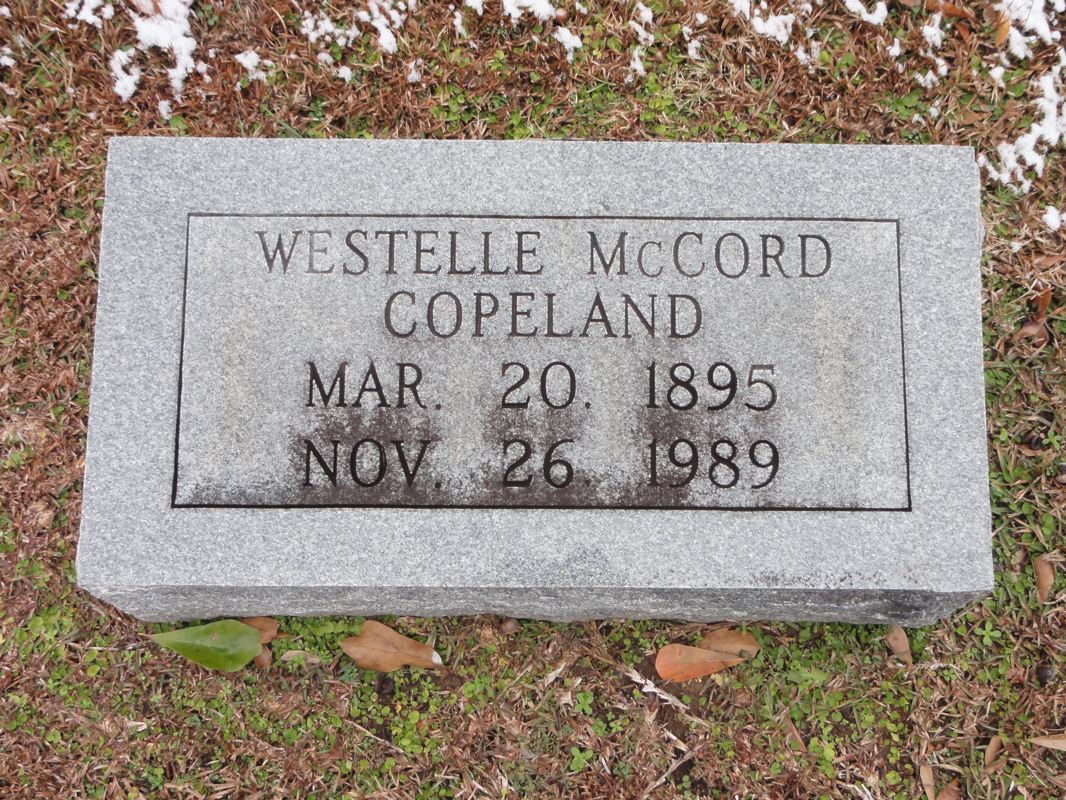
Westelle McCord Copeland
March 20, 1895
November 26, 1989
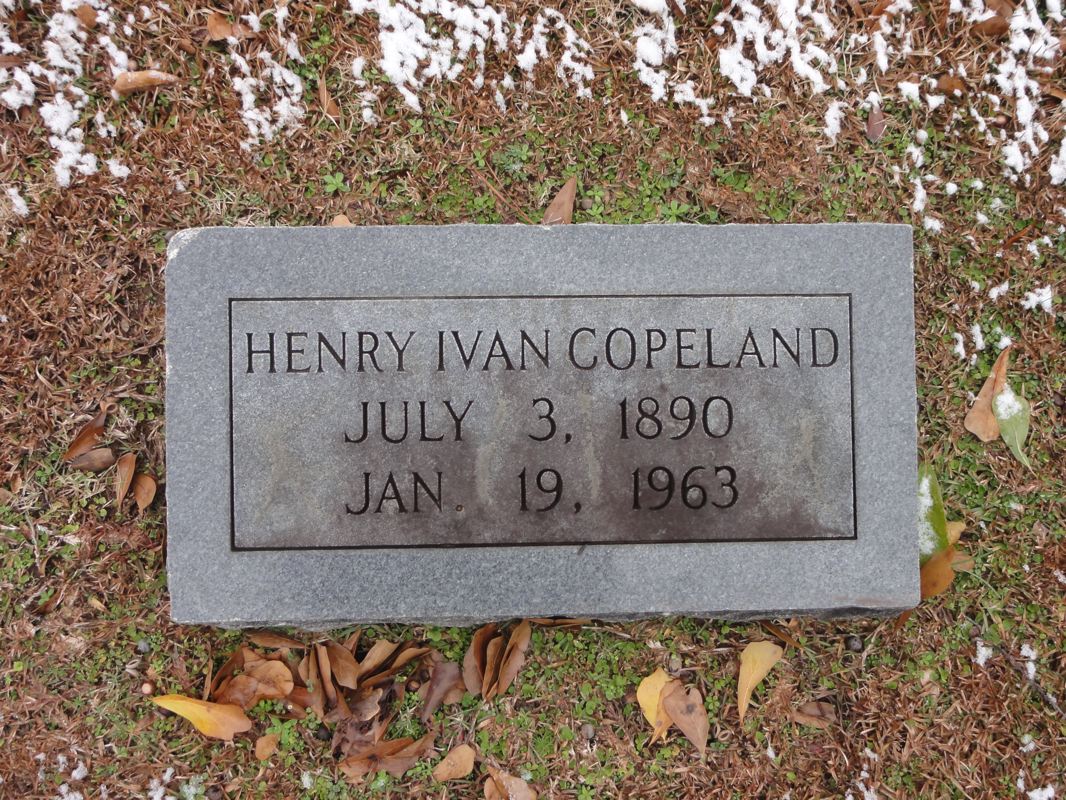
Henry Ivan Copeland
July 3, 1890
January 19, 1963
![]()
Photos Taken 12.26.2012
Site produced 12.28.2012
Courtesy of Scott Harp
www.TheRestorationMovement.com
Special Note: It was the pleasure of your web editor to visit the grave of H.I. Copeland during the Christmas holidays, 2012. Kyle and Rebecca Hooper, my son-in-law and daughter work with the congregation in Como, just south of Senatobia. Spending Christmas with them, I was able to visit Bethesda Cemetery the day after Christmas. Also buried in the cemetery is another gospel preacher of yesteryear, James P. Lowrey.
![]()
